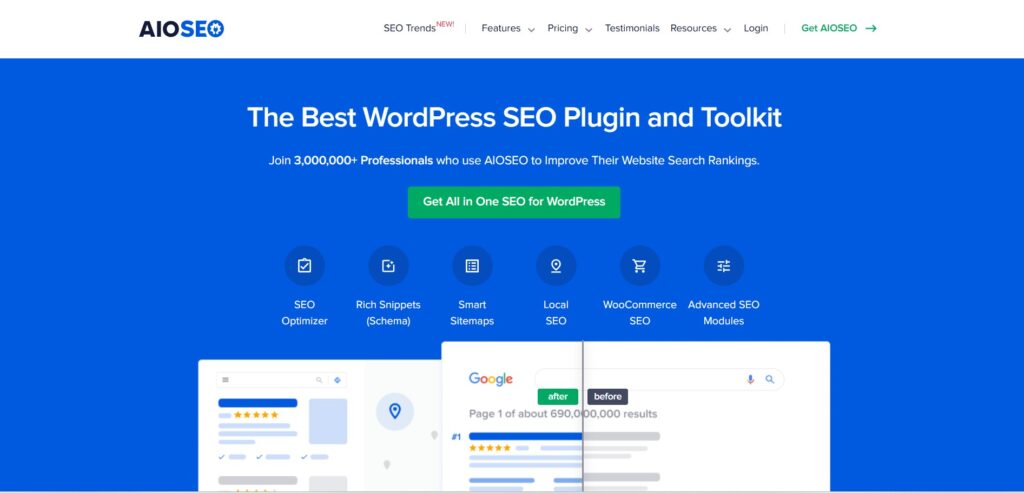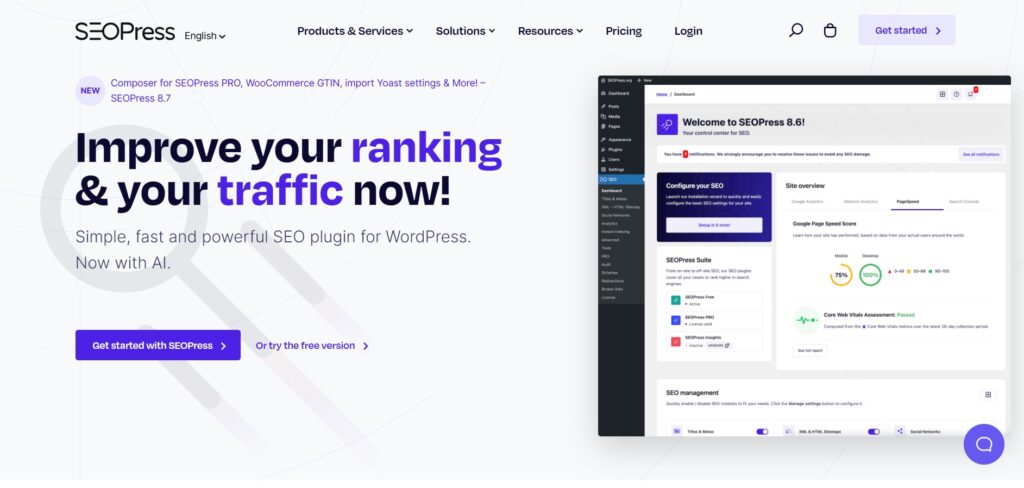5 WordPress SEO Plugins: What to Use and Why It Matters Most Now

I hope you enjoy this blog post. If you want Hello Bar to grow your leads, click here.
Author:
Mansi
Published
April 23, 2025

Table of Contents
If your company website is on WordPress, chances are you’ve already had someone mention WordPress SEO plugins to you. There are those who swear by them. Some believe they’re a magic bullet (they’re not). But here’s the honest truth: WordPress SEO plugins are like having tools in a toolbox. They can make things easier for you, but they will not do the work for you. You must still know what to repair and how to use the tools.
This blog distills it into plain language—what these plugins actually do, which ones are actually worth your while, and how to max out their benefits without getting lost in jargon.
Why SEO Even Matters for Your WordPress Site

Photo by Pixabay: https://www.pexels.com/photo/three-white-and-black-scrabble-tiles-on-brown-wooden-surface-270637/
SEO isn’t about appearing on Google. It’s about appearing for the right searches, at the right moment, in front of the right audience. If you’re a local business, appearing for a city-based search could bring in walk-in traffic. If you’re an e-commerce site, improved rankings equal more visitors, which (if your site’s decent) equals more sales.
Here’s the kicker: 68% of all online experiences begin with a search engine. So if your website isn’t optimized for search, you’re already missing most of the action.
But here’s the part most people miss: SEO isn’t just about keywords. It’s also about how fast your site loads, how mobile-friendly it is, how it’s structured, and whether Google’s bots can even crawl it properly.
This is where WordPress SEO plugins come in.
What Do WordPress SEO Plugins Actually Do?
At their core, SEO plugins help you:
- Optimize meta titles and descriptions
- Set up canonical URLs (to avoid duplicate content issues)
- Create XML sitemaps
- Control how pages are indexed
- Connect with Google Search Console
- Manage redirects (301, 302)
- Improve on-page SEO by giving content suggestions
- Optimize images (some do)
- Improve site speed (some include caching or lazy loading)
They aren’t magic. They won’t rank your website on their own. But they can help you get the fundamentals right, and that’s half the fight.
The Top WordPress SEO Plugins (and How They Actually Help)
Let’s go through the most popular WordPress SEO plugins, what they do best, and what to be aware of.
1. Yoast SEO

Best for: All-around SEO guidance and ease of use
Yoast has been around for a while and is one of the most used WordPress SEO plugins. It’s great if you’re just getting started or want quick, color-coded feedback on your content.
What’s good:
- Easy to manage titles, descriptions, and canonical tags
- Built-in XML sitemap generator
- Content analysis with suggestions (like keyword use, length, etc.)
- Schema markup support (helps Google understand your content better)
Things to know:
- Can feel bloated if you don’t need all the features
- Some useful functions (like redirect manager) are only in the premium version
And here’s something that proves its credibility: Yoast SEO boasts 5 million active installs, placing it among the most reliable WordPress SEO plugins in the community.
2. Rank Math

Best for: Power users who want more control and insights
Rank Math is one of the newer WordPress SEO plugins that’s picked up a lot of fans, and for good reason. It’s fast, flexible, and packs in features—even in the free version—that other WordPress SEO plugins charge for.
What’s good:
- Supports multiple keywords per page
- Google Schema markup builder
- Internal linking suggestions
- Integration with Google Analytics and Search Console
- 404 monitor and redirection manager included
Things to know:
- The interface has a bit of a learning curve
- It’s packed with features, which is great, but can be overwhelming at first
3. All in One SEO (AIOSEO)

Best for: Businesses that want a mix of simplicity and features
This WordPress SEO plugin does not fail to deliver its name and comes with the entire set of SEO features, particularly in the pro version. Also read our guide on SEO For Lead Generation: How To Skyrocket Organic Leads.
What’s good:
- Easy setup wizard
- WooCommerce SEO support
- Local SEO module (great for brick-and-mortar businesses)
- Social media previews
- Smart XML sitemaps
Things to know:
- Free version is a bit limited
- Some advanced features are locked behind the pro plan
4. SEOPress

Best for: Developers or businesses that want clean, fast performance
SEOPress is one of the well-coded and lightweight WordPress SEO plugins, meaning it won’t bog down your site. It’s also privacy-oriented (no usage tracking).
What’s good:
- Fully white-label (great for agencies)
- No ads or upsells in the free version
- Clean interface and solid features
- Supports custom post types, breadcrumbs, structured data
Things to know:
- Not as beginner-friendly as Yoast
- Community isn’t as large, so support may take more time
5. The SEO Framework

Best for: Minimalist users who want automation and speed
This WordPress SEO plugin doesn’t scream to be noticed. It simply works quietly and effectively. No nag, no ad, just pure SEO assistance.
What’s good:
- Lightweight and fast
- Strong focus on automation (auto-generates titles and descriptions if you don’t set them)
- Clean UI with color-coded suggestions
Things to know:
- Fewer features compared to Yoast or Rank Math
- May not suit users who want granular control over every element
Bonus Tools (That Aren’t Traditional SEO Plugins But Still Matter)
While the above are your core WordPress SEO plugins, here are some other plugins that support your SEO efforts:
- WP Rocket — caching and speed performance
- Smush or ShortPixel — image compression
- Redirection — handle 301s and 404s
- Schema Pro — rich snippets and structured data
How to Choose the Right SEO Plugin for Your Business
No one-size-fits-all answer here. It’s all up to your team, your needs, and how much you want to get hands-on. But here’s a quick rundown anyway.
If you want to just follow the basics and be done:
→ Yoast SEO (free version is enough for most)
If you want a full feature-set without paying upfront:
→ Rank Math (free version is powerful)
If you’re running a local business and care about map listings, reviews, etc.:
→ AIOSEO with Local SEO module
If you’re a developer or run an agency:
→ SEOPress (white-label and no ads)
If you hate clutter and just want things to run smoothly:
→ The SEO Framework
Common Mistakes to Avoid (Even With Plugins)

Image by wayhomestudio on Freepik
Even with the best WordPress SEO plugins, your SEO won’t go far if you miss the basics. Here’s what not to do:
1. Thinking plugins do everything for you
They don’t. You also need to have good content, the proper keywords, backlinks, and an organized site hierarchy. Keep in mind, 53.3% of all website traffic is due to organic search, so that is work which truly pays.
2. Ignoring mobile performance
Most searches are done now on mobile. If your theme is not responsive or your site is slow to load on phones, rankings will be affected.
3. Skipping regular audits
SEO is not “set and forget.” Plugins will not notify you of content that has become outdated or pages that fell out of traffic. Utilize tools such as Google Search Console or Ahrefs to audit every few months.
4. Keyword stuffing
Some plugins may indicate a green light when you cram your keyword into each line. Don’t be fooled. Write naturally. Google’s smarter than that.
5. Not submitting your sitemap
Plugins can create sitemaps, but it’s up to you to submit them in Google Search Console. That’s how Google knows which pages to crawl.
How to Set It All Up (Without Breaking a Sweat)
If you’re not technical, here’s a basic checklist you can follow:
- Install your SEO plugin of choice
- Run the setup wizard
- Check your title and meta templates
- Generate and submit your sitemap
- Set up schema if needed
- Monitor performance
Pro tip: Pages buried deep in search won’t do you much good. Only 0.63% of people click on something from the second page of Google, so the goal should always be page one.
Final Thoughts: Do Plugins Replace SEO Work?
No, and never will.
WordPress SEO plugins exist to make your SEO configuration simpler, not to supplant strategy, content quality, or technical enhancements. Consider them akin to a GPS system in your automobile. Helpful, precise, trustworthy—but you still must have an idea of where you are going and drive competently in order to arrive.
If you’re serious about long-term results, pair your plugin with regular audits, quality content, a mobile-friendly design, and a clean, fast-loading site.
SEO plugins help your WordPress site do the basics right, but they’re not a substitute for good content, smart strategy, and regular upkeep. Pick the one that fits your needs, set it up properly, and treat it as a support system—not a solution.



